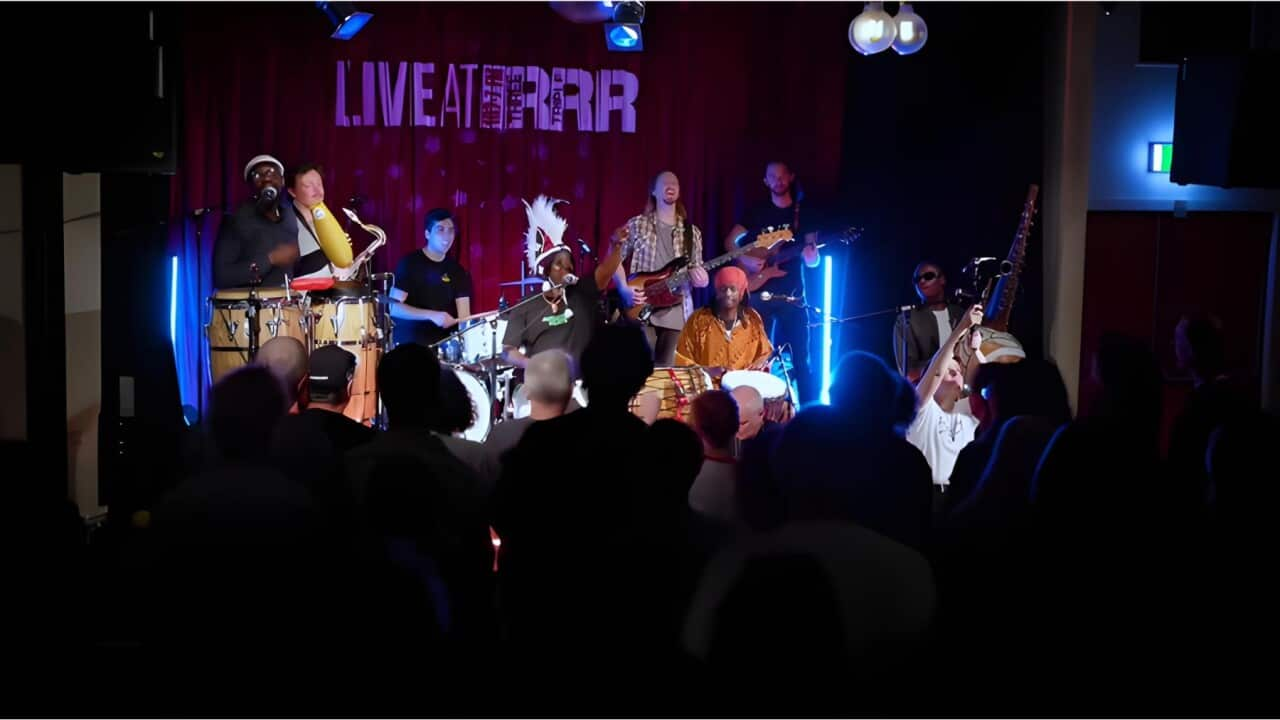TRANSCRIPT
Any time the Ausecuma Beats perform, an invitation is set down for all to come together and feel the rhythm and uplifting energy of West Africa.
The power of their music gives voice to culture, identity and struggle.
And for musician Boubacar Gaye, it's a passion his drums have kept beating to, despite a crescendo of challenges testing musicians in the industry.
“Our music is always fighting for peace and for joy. When you get that powerful energy - you get that powerful music. Life is tough but we try to keep positive and keep making music and you know the more there is challenge the more there is love.”
The drum master is originally from Senegal, but now calls Melbourne home.
It's here his band's ensemble of artists ... from Gambia, Mali, Guinea and Cuba... have honed their unique sound.
Like Amadou Suso - an expert player of the traditional Kora.
“What we do is different compared to any other music, it's like a melting pot I could say, and you could learn a lot from it because we don't just sing about love songs or whatever - the wars going on in the planet and stuff like that. As long as I can play and put a smile on people's faces that would make me happy.”
The wave of struggles facing the live music scene across the country is now being examined by a parliamentary inquiry.
It's hearing from musicians and those who make their acts possible.
As the industry tries to drum up support for its future, Howard Adams of the Australian Live Music Business Council says the opportunity offers a chance to coordinate a unified response.
“At a time when the music industry is fragmenting beyond belief this is a real time for cohesion where the left hand knows what the right hand is doing. There is no doubt there is a confluence of events and circumstances that are coming together to make this a particularly difficult time.”
Rising costs have made shows more expensive to put on.
Forcing festivals to cancel, and venues to shut their doors.
And while big acts like Taylor Swift continue to draw the masses, the rise of music streaming is making it tougher for the lesser-known to gain traction.
One solution proposed would see tours by blockbuster acts to the country face an extra charge on their ticket sales.
This would then be directed towards supporting grassroots music.
Mr Adams says it's an idea that's already being explored in the United Kingdom.
“Whilst it is a particularly difficult period and one many in the industry as saying they haven't seen the like of before - it's not something that is insurmountable there are still amazing artists coming through. Bands emerging, music being made and that just isn't going to stop so really it's just a question of how we work out the economics and methodology behind how we present that.”
Making a living in music is never an easy feat.
The Ausecuma Beats have been supported in doing this by a not-for-profit record label amplifying the work of artists from culturally diverse backgrounds, and helping them record and promote their music.
Joe Alexander from Music in Exile says it's about ensuring they have the best chance possible to succeed.
“Figure out what they need, what are some challenges they might be facing and then we figure out how to build our work accordingly. You know it's quite hard to build a financially viable career in independent music. And that can be doubly challenging if you are an artist that's migrated to Australia recently, or there might be language barriers or social or culture barriers - whatever so we kind of just exist to help artists navigate that and maybe overcome some of those barriers.”
Even as challenges hit the industry, musicians like Boubacar Gaye and the Ausecuma Beats players are determined to ensure the show goes on.
[[ We are musicians we have the talent but we need someone to give us a lift - but music is my life - no drum, no happy for Bouba, that's what I believe haha ]]













